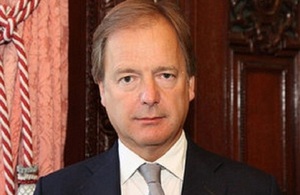Hugo Swire responds to letters on sexual violence in Burma
Foreign Office Minister Hugo Swire has responded to members of the public concerned about sexual violence in Burma.

Hugo Swire
The Foreign and Commonwealth Office acknowledges the concerns raised by members of the public in emails and letters about sexual violence in Burma. As Minister responsible for our relations with Burma, I want to update you on developments since my last letter in July 2014, and on the action the UK is taking to tackle this issue.
We continue to receive reports, not least the most recent one from the Women’s League of Burma, alleging sexual violence on the part of the Burmese army, which are extremely concerning. Officials at the British Embassy in Rangoon have met Women’s League of Burma to learn more and regularly meet with other civil society organisations that are working in this area.
The UK plays a leading international role in the prevention of sexual violence in conflict, and we continue to press the Burmese military and government to hold perpetrators to account. I raised this issue directly with the Commander in Chief of the Burmese military and the Northern Commander during my most recent visit to Burma in January 2014. In June 2014 we hosted the Global Summit to End Sexual Violence in Conflict. This was the largest Summit ever held to address the issue, involving 123 country delegations. We were pleased that the Burmese government endorsed the Declaration of Commitment to End Sexual Violence in Conflict and attended the Global Summit in London. This was a welcome and reassuring step towards recognising and addressing the problem of sexual violence in Burma.
Since then, we have encouraged the government to follow up its commitment with concrete action. More recently, in October 2014 the Minister of State for International Development, Desmond Swayne, discussed the issue when he met Burma’s Minister for Social Welfare, Relief and Resettlement. We have emphasised the importance of strengthening legislation to ensure that those responsible for these terrible crimes are held accountable for their actions and of improving access to services and justice for survivors. We believe the investigation of human rights abuses in Burma should be the responsibility of the Burmese government, and have made clear to them our view that all allegations must be dealt with through clear, independent and transparent investigative and prosecutorial processes which meet recognised international standards. The British Government remains ready to support this process.
At the June Summit the UK launched our third National Action Plan on Women, Peace and Security, which included Burma as one of our six country priorities. In December 2014, we published the Implementation Plan for those priority countries. For Burma, this will involve direct support to women’s civil society organisations, funding to support women’s involvement in the peace process and lobbying and encouragement of the Burmese government’s efforts to address sexual violence and promote gender equality.
We are also providing over £300,000 towards projects in Burma training women in basic legal skills, helping leaders prevent sexual violence in their own communities and working with non-state armed groups to promote adherence to international standards in respect of sexual violence and gender discrimination. On 4 November 2014, we announced the call for bids for human rights related projects for the coming financial year under the FCO Human Rights and Democracy Programme. At the time of writing, we are assessing bids for further work in Burma funded by this programme.
In conflict areas in Burma, the Department for International Development (DFID) provides over £500,000 in humanitarian funding directly supporting the prevention of sexual and gender-based violence and assistance to survivors. DFID also funds health, legal assistance and general protection projects that work partly on sexual violence issues and cases, including direct support to women’s civil society organisations. We continue to seek further opportunities to incorporate sexual violence prevention and protection for survivors into British Government work in Burma.
We are also working with UN agencies locally to develop a curriculum on sexual violence in conflict and on UN Security Council Resolution 1325 on Women, Peace and Security. This will be used in educational courses within Burma.
Regrettably, most instances of sexual violence still go unreported, making our work to improve access to justice even more crucial. It will take time and sustained engagement to reach a full conclusion. But while more still needs to be done, we should acknowledge progress where it has been made. For instance, there have been some instances of jurisdiction being handed over to civilian courts to help bring justice for survivors. This is an important step towards greater transparency and holding perpetrators properly accountable for their actions.
Further information about UK activities in Burma can be found on the UK and Burma website, or follow us on Facebook or Twitter: @UKinBurma.